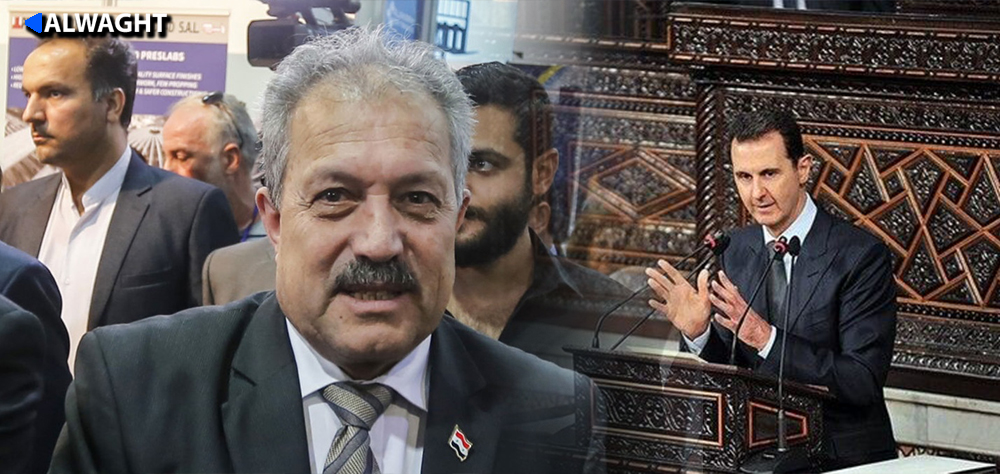Alwaght- Two weeks after taking oath as Syrian president for another seven-year term, Bashar al-Assad installed Hussein Arnous as new prime minister and tasked him with forming a new cabinet.
Records of the new PM
In a show of focus on the post-war economic needs of the Syrian society, President Assad picked a PM with long record of economic responsibilities. Arnous has been minister of water resources and watershed management since 2018. He was born in the village of Al-Tah, of the Ma'arrat Al-Nu'man region in Idlib province, and is therefore the first person from this province to hold the post of prime minister.
Arnous, 67, graduated from the University of Aleppo with a degree in urban engineering in 1978 and held many positions under former President Hafez al-Assad and then his son Bashar, and has held senior government positions since the 1980s.
His first position was the director of the Idlib Roads Company from 1983 to 1992, and then for five years he was the president of the Idlib Engineers Union.
His first national post was CEO of the General Company for Roads and Bridges from 1992 to 2002, after which he served as deputy minister of communications for two years.
In 2009, he was appointed by Assad governor of Deir ez-Zor, and he held the post up to 2011, the year he become governor of Quneitra province.
He held his first ministerial post in 2013 as minister of public services. Under Prime Minister Wael al-Halqi, he kept the post, until he was given the post of water resources.
Syrian economic challenges and Arnous priorities
Undoubtedly, the issue of Syria's reconstruction during the transition to peace of this war-torn country is the top priority of the new cabinet and the new PM.
The civil war and the presence of foreign terrorists with the support of foreign governments since 2011 have brought catastrophic consequences for the country's population, infrastructure and economy. It is estimated that $250 billion to $400 billion, or even $1 trillion, is needed to rebuild Syria. Even bigger challenges include loss of a large part of the skilled labor force as a result of migration, drop of the economic growth over the decade of war, devalued national currency, and destruction of public services infrastructure. Actually, paving the way for return of the refugees, which is now one of the top obsessions of the government, is tied to a wide range of measures which require national, regional, and international resolve to end the Syrian people's decade-long suffering under war conditions.
Meanwhile, given the internal constraints, the economic impacts of the Covid-19 pandemic, and the geopolitical interests of regional and global powers, there are major challenges to the comprehensive reconstruction of Syria, making the job of the future government extremely tough. Given that most of Syria's oil and gas fields and agricultural lands, which in the past were the Syrian government's main source of income, are still out of government control, reconstruction efforts to bring back the migrated population are facing severe shortages of domestic funding. Thus, in recent years, Damascus has put on the agenda measures to attract investment and international aids. The draft investment law in 2019 to improve the investment climate by reducing bureaucracy and offering incentives by reducing import tariffs and improving access to finance has been one of such measures. But despite planning and efforts to encourage Syrian entrepreneurs and businesspeople living abroad, to date, the government has not been very successful in its campaign, mainly due to the political-economic situation, especially the Western sanctions, which have restricted the Syrian government's engagement in economic activities.
Picturing Syria as a still-under-war country by Western and Arab media frightens the foreign investors and thus keeps them away from Syria. Transparency International ranked Syria as the world's third most corrupt country in 2019, and the World Bank put Syria 176 on its "ease of doing business list" in 2020.
Meanwhile, the European Union ties contributions to reconstruction to taking effective steps to settle the conflict and bring political solutions. This European condition serves as an obstacle ahead of Damascus access to the international aid packages and helps the crisis continue. Western countries are also concerned about the improvement of Damascus relations with Arab countries and Syria's return to the Arab League, and are setting up roadblocks ahead of the process.
Advancing the reconstruction with help of friendly countries
Damascus has made it clear that foreign participation in rebuilding will only include the countries that over the years of war and the plot to split Syria stood by the Syrian people. Although economic crises and sanctions continue to hamper Syria's economic partnership with allies Iran, Russia and China, Damascus has signed various MoUs with Tehran and Moscow. Defying the Western sanctions, Iran has had broad presence in Syrian energy, mining, power, agriculture, tourism, and communications sectors and seeks long-term partnership with the allied country in these fields. It signed agreements with Syria to expand Port of Latakia, construct power plans, and launch third mobile service network.
Over the past few years, as the Syrian government triumphantly retook much of the territories from foreign-backed terrorists, Iran sent more and more diplomatic delegations with economic agenda, the last one of which is the visit to Damascus of the Iranian parliament speaker Mohammad Bagher Ghalibaf last week. These visits make Iran a top trade and economic partner and oil products supplier to Syria.



























